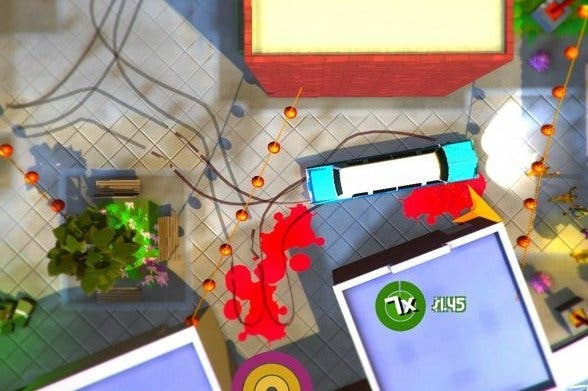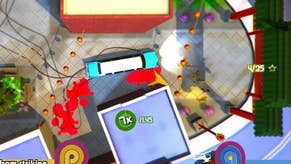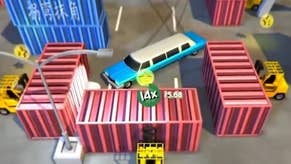Roundabout review
Centrifugal farce.
Roundabout's taken more from Kuru Kuru Kururin than its central spindizzy mechanic. Both cast you as endlessly rotating sticks, in essence, trying to navigate increasingly complex mazes without wiping out on the walls. And both also seem to share a delight in physicality, a belief in being things as much as video games. Roundabout's cityscape feels more like a shove ha'penny board or a marble run than a digital playground: you can almost touch the wood, the tin, the plastic, the cardboard. It all comes down to craftsmanship. The ideas are simple, but the sheer tactile loveliness of the implementation serves to elevate everything.
It helps, of course, that Kuru Kuru's spinning stick has become a spinning limousine here - the greatest Rotating Limousine in the world, in fact, driven by Georgio Manos, who gurns and grimaces through the live action cut-scenes with the stark and otherworldly chill of an old vaudeville star. The plot is genial blather, and it's a perfect fit for Roundabout's nonsensical premise. It's delivered with a kind of end-of-term prankishness as the developers call in all their game design buddies to stumble, with wonderful awkwardness, through what's presumably an in-jokey script that hands its big action moments to blurry stock footage. On paper, this sounds like a recipe for frat-boy disaster - and a similar approach was pretty disastrous in Twisted Pixel's LocoCycle. There's a human warmth here that LocoCycle missed, though: a playful acknowledgement of the narrative's ramshackle FMV nature that never quite slips into being too self-aware or smug.
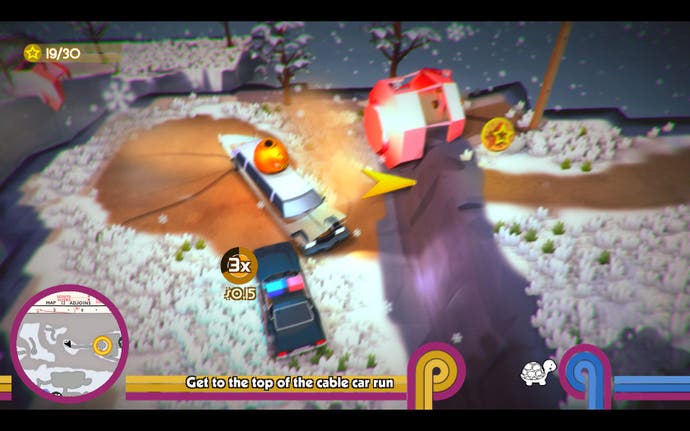
Kuru Kuru isn't the only touchstone, as its discrete mazes have been replaced with a chunky open world that you loop back and forth through, picking up fares at mission markers and working ever deeper into a story that involves love, drugs and accidental homicide. It's not surprising that the whole thing should rekindle memories of the very first GTA, since that too was an overhead game inspired by the nickle-and-dime victories of the mechanical arcades. It's still a treat to return to an uncomplicated colourful city that's stocked with such simple pleasures - loot bundles to discover, shops to switch out paintjobs and limo hats, sick jumps to pull off and pedestrians to mow down in order to keep a combo stoked. There's a sense of possibility to Roundabout's toytown world that seems greater than the sum of its parts and, again, it's all so convincingly physical. Bouncing off the walls will really make you wince, while traffic cones scatter at every junction and picket fencing crumples before your front bumper.
Moment to moment, it's almost Crazy Taxi, too, but a Crazy Taxi where the emphasis isn't on getting to your destination as quickly as possible s- it's on getting there in one piece. Kuru Kuru's always been such a powerful design because it channels very human frustrations: if you've ever got a bit of furniture accidentally wedged in a doorway, you'll understand the kind of aggrieved panic on offer here as you spin through traffic, around buttress chicanes, past rotating aircraft and rotating farm machinery. You're a cog in a world that's built only for pistons; you're the wrong shape in the wrong place. Smash against the walls too often and your reward is a juddering explosion of wheels and fenders. Slip through untouched, however, and there's a genuine thrill to it - a sense that you've manipulated geometry in a way that's allowed you to make the seemingly impossible possible.
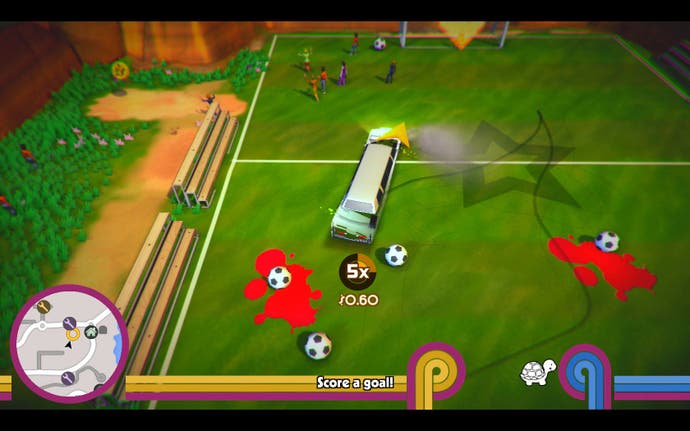
Roundabout is generous in its checkpointing, and it should be, since a game as wonderfully inconsequential as this should never be truly punishing. Brilliantly, though, you can actually make it as punishing as you want by tweaking variables in the extras menu. Some just add cosmetic changes like bobble-headed pedestrians and odd filters. Others, though, switch off the lights, switch on the one-hit explosion penalties, and even allow for permadeath. It's a wonderful, tasting-menu approach to balancing difficulty. It feels like a grown-up solution to an eternal design problem.
As the game progresses and the challenge escalates, you also get new tools to help you muddle through. Blue tyre walls change the direction of your spin whenever you bump into them, you can dash or jump, hovering through the air with the same sense of strained endurance you used to get from Yoshi, and you can unlock special moves such as slow motion, the ability to shrink in size, or even to change direction at the push of a button. Beyond that lie the costumes, the novelty horns and the shops you can buy up to earn more cash. More importantly, though, there's that multiplier system and the desire to ace the end-of-mission report card, encouraging you to pad out the campaign with expertise and a race up the leaderboards instead of by merely vacuuming up all the icons on the map until there's nothing left.
It's crazy how much effort has gone into the foundations of this tiny piece of Technicolor idiocy. It's also kind of noble, really. On Twitter recently, I watched a Vine that a game designer had made capturing the way your limo's tyre tracks change from black to red for a few sweet seconds as they race over a puddle of pedestrian blood. As with the flattened Hare Krishnas of the first GTA, there's no real horror to this, but rather a sweet, paintboxy thrill at the simple visual pleasure of it all. Roundabout's put a lot of effort into looking mindless, in other words. Those FMV cut-scenes may suggest a lark or a caper, but someone, somewhere, was really battling for this one.
